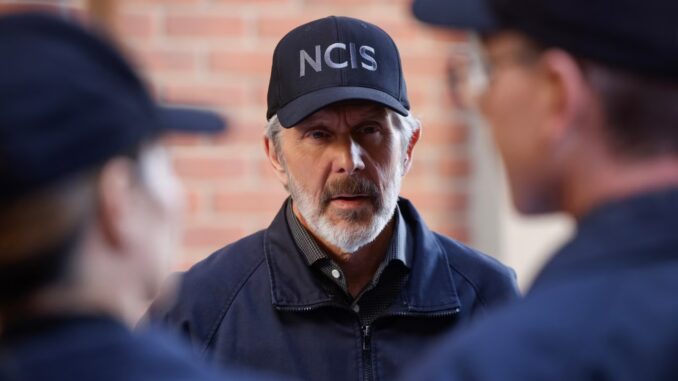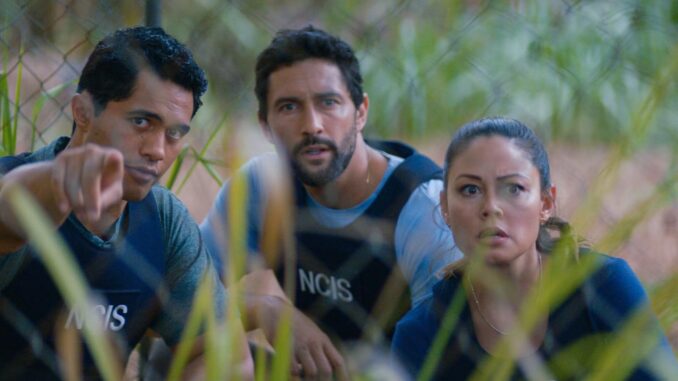
When CBS pulled the plug on NCIS: Hawai’i in April 2024, fans were blindsided. It wasn’t just another cancellation—it was a gut punch. The NCIS spinoff had carved its own place in the franchise’s legacy, blending high-stakes cases with an emotional, character-driven core led by the formidable Jane Tennant (Vanessa Lachey). But now, one year later, the wound has been ripped wide open again—by none other than NCIS itself.
In its 23rd season, the flagship series has done something bold—and, to many fans, deeply controversial. By reviving a storyline that was central to NCIS: Hawai’i’s tragic ending, CBS didn’t just revisit unfinished business; it reopened a chapter that fans had never gotten closure on.
And that choice has set the fandom ablaze.
🌊 A Year After the Storm: The Fallout of Hawai’i’s Abrupt End
The shock of NCIS: Hawai’i’s cancellation still lingers. The spinoff ended with Season 3, despite steady ratings, strong representation, and a passionate global following. Fans—and even the cast—learned of the decision only weeks before the finale, which ended on a haunting cliffhanger involving Tennant’s mentor, Maggie Shaw (Julie White).
Vanessa Lachey called the moment “gutting” and admitted she was “blindsided.” Co-star Tori Anderson (Kate Whistler) went further, labeling it “a huge loss for representation.”
They weren’t exaggerating. NCIS: Hawai’i broke ground in the franchise: the first female Special Agent-in-Charge, the first Asian-American woman leading an NCIS team, and the first same-sex romance handled with genuine care and heart. The series felt like progress—until it was suddenly gone.
CBS cited “financial and scheduling reasons.” Fans, however, saw something else: a network choosing NCIS: Origins over Hawai’i, trading representation for nostalgia.
⚓ The Elite That Fell — And The Story That Wouldn’t Die
One of Hawai’i’s defining storylines in its final season was NCIS Elite—a high-risk, top-tier task force led by Sam Hanna (LL Cool J). Their mission? To neutralize “Compound X,” a bioweapon so lethal it could wipe out a squad in seconds.
But before they could succeed, tragedy struck. Annalise Cruz (Rachel Mars) unleashed the toxin, killing nearly everyone in Elite. It was brutal, cinematic, and unforgettable—a turning point that left Tennant and her team reeling.
That’s where Hawai’i ended. No follow-up. No justice. No closure.
So when NCIS Season 23 decided to bring Elite back—without Tennant, Hanna, or anyone from Hawai’i—the reaction was explosive.
💥 Season 23: The Revival That Cut Too Deep
In Season 23, Director Leon Vance (Rocky Carroll) recruits Jessica Knight (Katrina Law) for “special operations”—a rebooted version of NCIS Elite. Fans quickly recognized the connection: this was Hawai’i’s story, resurrected on the flagship’s turf.
But something was off.
There was no mention of Jane Tennant. No acknowledgment of the team that fought—and died—during the original Elite mission. No tribute to the fallen. Not even a nod to Sam Hanna, the last person who had carried the torch for the task force.
It felt like Hawai’i’s ghosts were being erased.
Social media erupted. Fans accused CBS of “stealing Hawai’i’s legacy” and “turning pain into plot filler.” Some even called it “tone-deaf,” arguing that using the Elite storyline without its original characters was a betrayal of what Hawai’i stood for.
One fan summed it up bluntly on X:
“You can’t resurrect NCIS: Hawai’i’s trauma without letting Jane Tennant finish the story. That’s not revival. That’s disrespect.”
🩸 Representation, Erased
NCIS: Hawai’i wasn’t just another procedural—it represented voices that had long been missing from the NCIS universe. It gave viewers a woman of color leading a federal task force and showcased a same-sex relationship that wasn’t a subplot but a love story.
So when NCIS Season 23 used one of Hawai’i’s signature plots without its most diverse cast, the message stung. Fans saw it as symbolic: the flagship reclaiming the story, but not the representation.
Tennant’s team—Jesse Boone (Noah Mills), Lucy Tara (Yasmine Al-Bustami), Kai Holman (Alex Tarrant)—were the heart of Hawai’i. Their absence in a story so intertwined with their trauma feels like an omission too big to ignore.
It wasn’t just a missed opportunity. It was a reminder of what the franchise had lost.
🕰️ Could Redemption Still Come?
There’s still a flicker of hope. CBS has a track record of course-correcting under fan pressure—after all, S.W.A.T. was famously uncanceled following public outcry. And with NCIS: Origins and the flagship both riding high, there’s talk among viewers that the network could one day bring Hawai’i’s team back for a special event or limited revival.
Even a cameo—Vanessa Lachey’s Tennant consulting on the Elite revival, or Sam Hanna reappearing for closure—would mean the world to fans still mourning the show.

🔥 The Legacy That Refuses to Fade
One year later, NCIS: Hawai’i remains the most talked-about NCIS spinoff ever canceled. It was progressive, heartfelt, and daring—and that’s precisely why its absence hurts so much.
And now, with the flagship show dipping into its unfinished storylines, it’s as if CBS has reminded everyone of just how powerful Hawai’i’s legacy was—and how hollow its absence feels.
In trying to move forward, NCIS has unknowingly reignited a movement. Fans aren’t just remembering Hawai’i; they’re demanding justice for it.
Because you can’t just cancel a story like that—and expect the ocean to stay quiet.